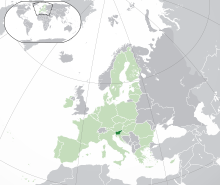LGBT rights in Slovenia
| LGBT rights in Slovenia | |
|---|---|

Location of Slovenia (dark green)
– in Europe (light green & dark grey) |
|
| Same-sex sexual activity legal? | Male legal since 1977, female was never criminalized |
| Military service | Gays and lesbians allowed to serve |
| Discrimination protections | Sexual orientation protection (see below) |
| Family rights | |
| Recognition of relationships |
Partnership since 2006 |
| Adoption | Step-child adoption and recognition of abroad-registered same-sex adoptions |
– in Europe (light green & dark grey)
– in the European Union (light green) – [Legend]
Lesbian, gay, bisexual, and transgender (LGBT) people in Slovenia may face some challenges not experienced by non-LGBT residents, though the laws concerning lesbian, gay, bisexual, and transgender citizens (LGBT) have evolved considerably over time.
Under the Penal Code of 30 June 1959 male homosexual acts were illegal in all of (now former) Yugoslavia. During the first half of the 1970s the power over penal legislation was devolved from the Federal Republic to the eight states and provinces. A new penal code that decriminalised homosexual intercourse passed in 1976 and came into force in 1977. All discriminatory provisions were removed. There were no references to lesbian relationships in the old legislation.
Same-sex sexual activity has been legal since 1977.
Registered partnership for same-sex couples has been legal since 23 July 2006, with limited inheritance, social security and next-of-kin rights.
In July 2009 the Constitutional Court held that Article 22 of the Registration of Same Sex Partnerships Act (RSSPA) violated the right to non-discrimination under Article 14 of the Constitution on the ground of sexual orientation, and required that the legislature remedy the established inconsistency within six months.
On 3 March 2015, the Assembly passed the bill to legalize same-sex marriage in a 51-28 vote. On 10 March 2015, the National Council rejected a motion to require the Assembly to vote on the bill again, in a 14-23 vote. Opponents of the bill launched a petition for a referendum. The petitioners have gained more than enough signatures for a referendum. On 22 October 2015, in a 5-4 vote, the Constitutional Court ruled the National Assembly could not interpret the constitution and that the vote to block the referendum was illegal. The referendum took place on 20 December 2015 and the bill was rejected.
On 21 April 2016, the Assembly approved the bill to give same-sex partnerships all rights of marriage, except adoption and in vitro fertilisation. A petition for a referendum was launched, but the president of the Assembly didn't allow the referendum. He said that it was an abuse of the referendum law. The law took effect on 24 May 2016 and it became operational on 24 February 2017 without changes in marriage (only civil partnership).
...
Wikipedia
